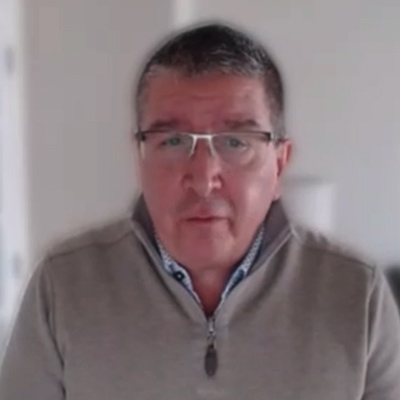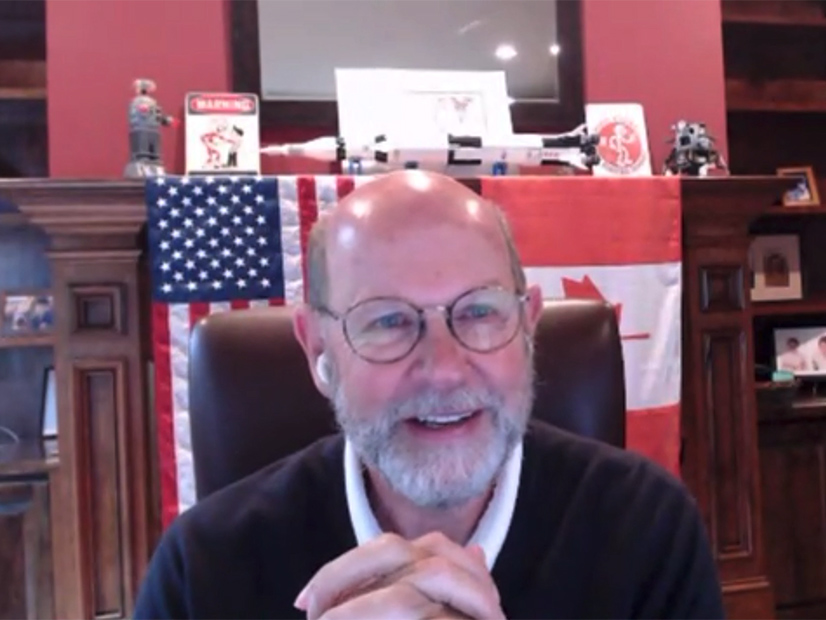NERC CEO Jim Robb felt “sobered by the amount of work in front of us” but confident that the ERO can address the electric grid’s “hyper complex risk environment,” he said in a media call Wednesday to mark the five-year anniversary of his joining the organization.
The rapidly changing grid and its implications for reliability were a major theme of the call, which also featured Manny Cancel, a senior vice president at NERC and CEO of the Electricity Information Sharing and Analysis Center (E-ISAC), discussing physical and cybersecurity challenges. Robb said the switch from conventional spinning generation to solar, wind and other inverter-based resources (IBRs) should spur stakeholders to rethink how they provide “essential reliability services.”
“We really need to shift our thinking around reliability away from capacity installed plus reserve margin, which really accounts for random events that occur out on the grid, [and] to recognize that we now have a generation mix that’s increasingly impacted by common conditions,” Robb said. “Wind droughts, solar droughts — these things can affect a large amount of generation, and not in a random way. We really need to get our heads around that dynamic and the uncertainties around fuel as we think through the sector’s ability to serve [the] energy needs of customers.”
Shifting toward intermittent generation also means utilities nationwide have increasingly adopted natural gas as a balancing resource, Robb said, making coordination between the electric and gas industries critical. This is not always easy, he acknowledged, saying that while “the gas industry is amazing at what it does,” it “wasn’t designed to serve highly variable loads like electric power.”
 E-ISAC CEO Manny Cancel | NERC
E-ISAC CEO Manny Cancel | NERCUsing gas as a lynchpin for the generation fleet has therefore created strains that both industries need to work on together, with help from policymakers and regulators as well, Robb continued, adding that “it’s as hard to start a new gas pipeline … as it is to build electric transmission.”
“Because of electrification policies, electric transportation and moving space heating toward an electric fuel, we’re going to be growing load, and we’re having enough trouble just keeping up with where we are right now,” Robb said.
NERC has an important role to play in educating the various governmental agencies that oversee the development of the grid and gas system, Robb said; this takes the form of putting “steadfast protection … around NERC’s objectivity and rooting our perspectives in science and technology” as the ERO communicates with regulators.
He said the organization’s 2022 Summer Reliability Assessment, and its warnings about the impact of severe weather and transmission outages, “provoked a very strong and positive response in terms of interagency communication” about the importance of reliability services. (See West, Texas, Midwest at Risk of Summer Shortfalls, NERC Says.) He also pointed to a recently announced memorandum of understanding between the Environmental Protection Agency and the Department of Energy as a sign that regulators are taking the challenge seriously. (See DOE, EPA Team Up on Reliability Efforts.)
Cancel also discussed the importance of cross-industry collaboration in the security space, calling the E-ISAC a “conduit to the industry” for government agencies, “not only for information sharing, but also to discuss policy and other issues.” He said the E-ISAC’s level of engagement with policymakers “has never been stronger,” while its relationship with its counterparts in other critical industry sectors has also become tighter since Russia invaded Ukraine last year.
Additionally, Cancel pointed to his organization’s efforts to combat supply chain weaknesses through its vendor affiliate program. The program, launched last year, is intended to give vendors a voice in the debates over supply chain issues and provide their “keen insights” on the risk landscape.
“They are doing things from a product perspective … to protect themselves too. We can certainly learn from them, and they can be a powerful voice, particularly the vendors that are used pervasively across the electricity sector,” Cancel said. “That’s not only going on through the [E-ISAC]; it’s going on through other venues [like] trade associations, [and] the government has [been] having dialogue with the vendor community. … I’m not declaring victory, and underscoring that has to continue, but [it’s] a very important step forward.”




